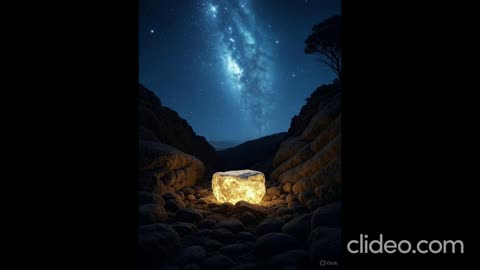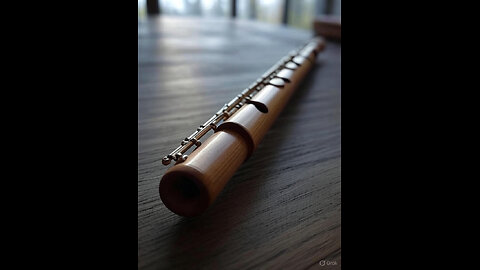-
Music for Throat Chakra Activation, Sound of Waters
 nospecCreated by Nospec https://www.youtube.com/@yoja....../featured #meditationmusic #mysticalmusic #astralmusic #yogananda Paramahansa Yogananda, in his teachings on yoga and meditation (particularly through Kriya Yoga), described the chakras as subtle energy centers along the spine that correspond to astral cerebrospinal centers. These are gateways for spiritual ascent, and when activated during deep meditation, they produce distinct inner astral sounds or vibrations, which are manifestations of the cosmic Aum (Om) vibration. Yogananda often referred to six primary chakras (with the seventh, Sahasrara, as the ultimate center of liberation), and the sounds are heard as one progresses upward through meditation practices. Below is a table summarizing the names, locations, and associated special sounds (or "music") for each chakra, based on Yogananda's descriptions. The sounds are typically experienced as subtle auditory phenomena in meditation, resembling natural or musical elements, and they culminate in the full symphony of Om Chakra Name,Location, Associated Sound/Music When Activated Muladhara(Root) Coccygeal center(base of the spine, near the tailbone) Humming or buzzing like a bumblebee Svadhisthana(Sacral) Sacral center(lower spine, about 2 inches above Muladhara, opposite the genitals)Melodious tone like a flute Manipura(Solar Plexus) Lumbar center(mid-spine, opposite the navel) Strumming or vibrating like a harp(or veena, a stringed instrument) Anahata(Heart) Dorsal center(upper spine, opposite the heart/chest) Ringing or chiming like bells(or a gong) Vishuddha(Throat) Cervical center(neck/base of throat) Roaring like the ocean, thunder, or a conch shell Ajna(Third Eye) Medullary center(between the eyebrows, Symphony of all sounds, or the full cosmic roar/hum of Om(Aum) Sahasrara (Crown)Cerebral center (top of the head, thousand-petaled lotus)Transcendent silence or the ultimate vibration of Om, beyond distinct sounds (often described as the point where all sounds merge into cosmic consciousness) These sounds perceived inwardly as the yogi interiorizes the life force and focuses on the spinal centers. They represent the progressive refinement of the cosmic vibration, starting from grosser elements (earth, water, etc.) at the lower chakras to subtler ones higher up. Yogananda incorporated these into a chant called the "Om Song" or "Cosmic Chant," where he poetically described the sounds ascending through the chakras. For example, practices like listening to the inner Om technique in meditation can help activate and attune to these vibrations11 views
nospecCreated by Nospec https://www.youtube.com/@yoja....../featured #meditationmusic #mysticalmusic #astralmusic #yogananda Paramahansa Yogananda, in his teachings on yoga and meditation (particularly through Kriya Yoga), described the chakras as subtle energy centers along the spine that correspond to astral cerebrospinal centers. These are gateways for spiritual ascent, and when activated during deep meditation, they produce distinct inner astral sounds or vibrations, which are manifestations of the cosmic Aum (Om) vibration. Yogananda often referred to six primary chakras (with the seventh, Sahasrara, as the ultimate center of liberation), and the sounds are heard as one progresses upward through meditation practices. Below is a table summarizing the names, locations, and associated special sounds (or "music") for each chakra, based on Yogananda's descriptions. The sounds are typically experienced as subtle auditory phenomena in meditation, resembling natural or musical elements, and they culminate in the full symphony of Om Chakra Name,Location, Associated Sound/Music When Activated Muladhara(Root) Coccygeal center(base of the spine, near the tailbone) Humming or buzzing like a bumblebee Svadhisthana(Sacral) Sacral center(lower spine, about 2 inches above Muladhara, opposite the genitals)Melodious tone like a flute Manipura(Solar Plexus) Lumbar center(mid-spine, opposite the navel) Strumming or vibrating like a harp(or veena, a stringed instrument) Anahata(Heart) Dorsal center(upper spine, opposite the heart/chest) Ringing or chiming like bells(or a gong) Vishuddha(Throat) Cervical center(neck/base of throat) Roaring like the ocean, thunder, or a conch shell Ajna(Third Eye) Medullary center(between the eyebrows, Symphony of all sounds, or the full cosmic roar/hum of Om(Aum) Sahasrara (Crown)Cerebral center (top of the head, thousand-petaled lotus)Transcendent silence or the ultimate vibration of Om, beyond distinct sounds (often described as the point where all sounds merge into cosmic consciousness) These sounds perceived inwardly as the yogi interiorizes the life force and focuses on the spinal centers. They represent the progressive refinement of the cosmic vibration, starting from grosser elements (earth, water, etc.) at the lower chakras to subtler ones higher up. Yogananda incorporated these into a chant called the "Om Song" or "Cosmic Chant," where he poetically described the sounds ascending through the chakras. For example, practices like listening to the inner Om technique in meditation can help activate and attune to these vibrations11 views -
Music for 3rd Eye Opening, Aum Sound
 nospecCreated by Nospec https://www.youtube.com/@yoja....../featured #meditationmusic #mysticalmusic #astralmusic #yogananda Paramahansa Yogananda, in his teachings on yoga and meditation (particularly through Kriya Yoga), described the chakras as subtle energy centers along the spine that correspond to astral cerebrospinal centers. These are gateways for spiritual ascent, and when activated during deep meditation, they produce distinct inner astral sounds or vibrations, which are manifestations of the cosmic Aum (Om) vibration. Yogananda often referred to six primary chakras (with the seventh, Sahasrara, as the ultimate center of liberation), and the sounds are heard as one progresses upward through meditation practices. Below is a table summarizing the names, locations, and associated special sounds (or "music") for each chakra, based on Yogananda's descriptions. The sounds are typically experienced as subtle auditory phenomena in meditation, resembling natural or musical elements, and they culminate in the full symphony of Om Chakra Name,Location, Associated Sound/Music When Activated Muladhara(Root) Coccygeal center(base of the spine, near the tailbone) Humming or buzzing like a bumblebee Svadhisthana(Sacral) Sacral center(lower spine, about 2 inches above Muladhara, opposite the genitals)Melodious tone like a flute Manipura(Solar Plexus) Lumbar center(mid-spine, opposite the navel) Strumming or vibrating like a harp(or veena, a stringed instrument) Anahata(Heart) Dorsal center(upper spine, opposite the heart/chest) Ringing or chiming like bells(or a gong) Vishuddha(Throat) Cervical center(neck/base of throat) Roaring like the ocean, thunder, or a conch shell Ajna(Third Eye) Medullary center(between the eyebrows, Symphony of all sounds, or the full cosmic roar/hum of Om(Aum) Sahasrara (Crown)Cerebral center (top of the head, thousand-petaled lotus)Transcendent silence or the ultimate vibration of Om, beyond distinct sounds (often described as the point where all sounds merge into cosmic consciousness) These sounds perceived inwardly as the yogi interiorizes the life force and focuses on the spinal centers. They represent the progressive refinement of the cosmic vibration, starting from grosser elements (earth, water, etc.) at the lower chakras to subtler ones higher up. Yogananda incorporated these into a chant called the "Om Song" or "Cosmic Chant," where he poetically described the sounds ascending through the chakras. For example, practices like listening to the inner Om technique in meditation can help activate and attune to these vibrations11 views
nospecCreated by Nospec https://www.youtube.com/@yoja....../featured #meditationmusic #mysticalmusic #astralmusic #yogananda Paramahansa Yogananda, in his teachings on yoga and meditation (particularly through Kriya Yoga), described the chakras as subtle energy centers along the spine that correspond to astral cerebrospinal centers. These are gateways for spiritual ascent, and when activated during deep meditation, they produce distinct inner astral sounds or vibrations, which are manifestations of the cosmic Aum (Om) vibration. Yogananda often referred to six primary chakras (with the seventh, Sahasrara, as the ultimate center of liberation), and the sounds are heard as one progresses upward through meditation practices. Below is a table summarizing the names, locations, and associated special sounds (or "music") for each chakra, based on Yogananda's descriptions. The sounds are typically experienced as subtle auditory phenomena in meditation, resembling natural or musical elements, and they culminate in the full symphony of Om Chakra Name,Location, Associated Sound/Music When Activated Muladhara(Root) Coccygeal center(base of the spine, near the tailbone) Humming or buzzing like a bumblebee Svadhisthana(Sacral) Sacral center(lower spine, about 2 inches above Muladhara, opposite the genitals)Melodious tone like a flute Manipura(Solar Plexus) Lumbar center(mid-spine, opposite the navel) Strumming or vibrating like a harp(or veena, a stringed instrument) Anahata(Heart) Dorsal center(upper spine, opposite the heart/chest) Ringing or chiming like bells(or a gong) Vishuddha(Throat) Cervical center(neck/base of throat) Roaring like the ocean, thunder, or a conch shell Ajna(Third Eye) Medullary center(between the eyebrows, Symphony of all sounds, or the full cosmic roar/hum of Om(Aum) Sahasrara (Crown)Cerebral center (top of the head, thousand-petaled lotus)Transcendent silence or the ultimate vibration of Om, beyond distinct sounds (often described as the point where all sounds merge into cosmic consciousness) These sounds perceived inwardly as the yogi interiorizes the life force and focuses on the spinal centers. They represent the progressive refinement of the cosmic vibration, starting from grosser elements (earth, water, etc.) at the lower chakras to subtler ones higher up. Yogananda incorporated these into a chant called the "Om Song" or "Cosmic Chant," where he poetically described the sounds ascending through the chakras. For example, practices like listening to the inner Om technique in meditation can help activate and attune to these vibrations11 views -
Music for Heart Chakra Activation, Chiming like a Gong
 nospecCreated by Nospec https://www.youtube.com/@yoja....../featured #meditationmusic #mysticalmusic #astralmusic #yogananda Paramahansa Yogananda, in his teachings on yoga and meditation (particularly through Kriya Yoga), described the chakras as subtle energy centers along the spine that correspond to astral cerebrospinal centers. These are gateways for spiritual ascent, and when activated during deep meditation, they produce distinct inner astral sounds or vibrations, which are manifestations of the cosmic Aum (Om) vibration. Yogananda often referred to six primary chakras (with the seventh, Sahasrara, as the ultimate center of liberation), and the sounds are heard as one progresses upward through meditation practices. Below is a table summarizing the names, locations, and associated special sounds (or "music") for each chakra, based on Yogananda's descriptions. The sounds are typically experienced as subtle auditory phenomena in meditation, resembling natural or musical elements, and they culminate in the full symphony of Om Chakra Name,Location, Associated Sound/Music When Activated Muladhara(Root) Coccygeal center(base of the spine, near the tailbone) Humming or buzzing like a bumblebee Svadhisthana(Sacral) Sacral center(lower spine, about 2 inches above Muladhara, opposite the genitals)Melodious tone like a flute Manipura(Solar Plexus) Lumbar center(mid-spine, opposite the navel) Strumming or vibrating like a harp(or veena, a stringed instrument) Anahata(Heart) Dorsal center(upper spine, opposite the heart/chest) Ringing or chiming like bells(or a gong) Vishuddha(Throat) Cervical center(neck/base of throat) Roaring like the ocean, thunder, or a conch shell Ajna(Third Eye) Medullary center(between the eyebrows, Symphony of all sounds, or the full cosmic roar/hum of Om(Aum) Sahasrara (Crown)Cerebral center (top of the head, thousand-petaled lotus)Transcendent silence or the ultimate vibration of Om, beyond distinct sounds (often described as the point where all sounds merge into cosmic consciousness) These sounds perceived inwardly as the yogi interiorizes the life force and focuses on the spinal centers. They represent the progressive refinement of the cosmic vibration, starting from grosser elements (earth, water, etc.) at the lower chakras to subtler ones higher up. Yogananda incorporated these into a chant called the "Om Song" or "Cosmic Chant," where he poetically described the sounds ascending through the chakras. For example, practices like listening to the inner Om technique in meditation can help activate and attune to these vibrations12 views
nospecCreated by Nospec https://www.youtube.com/@yoja....../featured #meditationmusic #mysticalmusic #astralmusic #yogananda Paramahansa Yogananda, in his teachings on yoga and meditation (particularly through Kriya Yoga), described the chakras as subtle energy centers along the spine that correspond to astral cerebrospinal centers. These are gateways for spiritual ascent, and when activated during deep meditation, they produce distinct inner astral sounds or vibrations, which are manifestations of the cosmic Aum (Om) vibration. Yogananda often referred to six primary chakras (with the seventh, Sahasrara, as the ultimate center of liberation), and the sounds are heard as one progresses upward through meditation practices. Below is a table summarizing the names, locations, and associated special sounds (or "music") for each chakra, based on Yogananda's descriptions. The sounds are typically experienced as subtle auditory phenomena in meditation, resembling natural or musical elements, and they culminate in the full symphony of Om Chakra Name,Location, Associated Sound/Music When Activated Muladhara(Root) Coccygeal center(base of the spine, near the tailbone) Humming or buzzing like a bumblebee Svadhisthana(Sacral) Sacral center(lower spine, about 2 inches above Muladhara, opposite the genitals)Melodious tone like a flute Manipura(Solar Plexus) Lumbar center(mid-spine, opposite the navel) Strumming or vibrating like a harp(or veena, a stringed instrument) Anahata(Heart) Dorsal center(upper spine, opposite the heart/chest) Ringing or chiming like bells(or a gong) Vishuddha(Throat) Cervical center(neck/base of throat) Roaring like the ocean, thunder, or a conch shell Ajna(Third Eye) Medullary center(between the eyebrows, Symphony of all sounds, or the full cosmic roar/hum of Om(Aum) Sahasrara (Crown)Cerebral center (top of the head, thousand-petaled lotus)Transcendent silence or the ultimate vibration of Om, beyond distinct sounds (often described as the point where all sounds merge into cosmic consciousness) These sounds perceived inwardly as the yogi interiorizes the life force and focuses on the spinal centers. They represent the progressive refinement of the cosmic vibration, starting from grosser elements (earth, water, etc.) at the lower chakras to subtler ones higher up. Yogananda incorporated these into a chant called the "Om Song" or "Cosmic Chant," where he poetically described the sounds ascending through the chakras. For example, practices like listening to the inner Om technique in meditation can help activate and attune to these vibrations12 views -
Music for Solar Plexus Chakra Activation, Strumming like a Harp
 nospecCreated by Nospec https://www.youtube.com/@yoja....../featured #meditationmusic #mysticalmusic #astralmusic #yogananda Paramahansa Yogananda, in his teachings on yoga and meditation (particularly through Kriya Yoga), described the chakras as subtle energy centers along the spine that correspond to astral cerebrospinal centers. These are gateways for spiritual ascent, and when activated during deep meditation, they produce distinct inner astral sounds or vibrations, which are manifestations of the cosmic Aum (Om) vibration. Yogananda often referred to six primary chakras (with the seventh, Sahasrara, as the ultimate center of liberation), and the sounds are heard as one progresses upward through meditation practices. Below is a table summarizing the names, locations, and associated special sounds (or "music") for each chakra, based on Yogananda's descriptions. The sounds are typically experienced as subtle auditory phenomena in meditation, resembling natural or musical elements, and they culminate in the full symphony of Om Chakra Name,Location, Associated Sound/Music When Activated Muladhara(Root) Coccygeal center(base of the spine, near the tailbone) Humming or buzzing like a bumblebee Svadhisthana(Sacral) Sacral center(lower spine, about 2 inches above Muladhara, opposite the genitals)Melodious tone like a flute Manipura(Solar Plexus) Lumbar center(mid-spine, opposite the navel) Strumming or vibrating like a harp(or veena, a stringed instrument) Anahata(Heart) Dorsal center(upper spine, opposite the heart/chest) Ringing or chiming like bells(or a gong) Vishuddha(Throat) Cervical center(neck/base of throat) Roaring like the ocean, thunder, or a conch shell Ajna(Third Eye) Medullary center(between the eyebrows, Symphony of all sounds, or the full cosmic roar/hum of Om(Aum) Sahasrara (Crown)Cerebral center (top of the head, thousand-petaled lotus)Transcendent silence or the ultimate vibration of Om, beyond distinct sounds (often described as the point where all sounds merge into cosmic consciousness) These sounds perceived inwardly as the yogi interiorizes the life force and focuses on the spinal centers. They represent the progressive refinement of the cosmic vibration, starting from grosser elements (earth, water, etc.) at the lower chakras to subtler ones higher up. Yogananda incorporated these into a chant called the "Om Song" or "Cosmic Chant," where he poetically described the sounds ascending through the chakras. For example, practices like listening to the inner Om technique in meditation can help activate and attune to these vibrations11 views
nospecCreated by Nospec https://www.youtube.com/@yoja....../featured #meditationmusic #mysticalmusic #astralmusic #yogananda Paramahansa Yogananda, in his teachings on yoga and meditation (particularly through Kriya Yoga), described the chakras as subtle energy centers along the spine that correspond to astral cerebrospinal centers. These are gateways for spiritual ascent, and when activated during deep meditation, they produce distinct inner astral sounds or vibrations, which are manifestations of the cosmic Aum (Om) vibration. Yogananda often referred to six primary chakras (with the seventh, Sahasrara, as the ultimate center of liberation), and the sounds are heard as one progresses upward through meditation practices. Below is a table summarizing the names, locations, and associated special sounds (or "music") for each chakra, based on Yogananda's descriptions. The sounds are typically experienced as subtle auditory phenomena in meditation, resembling natural or musical elements, and they culminate in the full symphony of Om Chakra Name,Location, Associated Sound/Music When Activated Muladhara(Root) Coccygeal center(base of the spine, near the tailbone) Humming or buzzing like a bumblebee Svadhisthana(Sacral) Sacral center(lower spine, about 2 inches above Muladhara, opposite the genitals)Melodious tone like a flute Manipura(Solar Plexus) Lumbar center(mid-spine, opposite the navel) Strumming or vibrating like a harp(or veena, a stringed instrument) Anahata(Heart) Dorsal center(upper spine, opposite the heart/chest) Ringing or chiming like bells(or a gong) Vishuddha(Throat) Cervical center(neck/base of throat) Roaring like the ocean, thunder, or a conch shell Ajna(Third Eye) Medullary center(between the eyebrows, Symphony of all sounds, or the full cosmic roar/hum of Om(Aum) Sahasrara (Crown)Cerebral center (top of the head, thousand-petaled lotus)Transcendent silence or the ultimate vibration of Om, beyond distinct sounds (often described as the point where all sounds merge into cosmic consciousness) These sounds perceived inwardly as the yogi interiorizes the life force and focuses on the spinal centers. They represent the progressive refinement of the cosmic vibration, starting from grosser elements (earth, water, etc.) at the lower chakras to subtler ones higher up. Yogananda incorporated these into a chant called the "Om Song" or "Cosmic Chant," where he poetically described the sounds ascending through the chakras. For example, practices like listening to the inner Om technique in meditation can help activate and attune to these vibrations11 views -
Music for Sacrum chakra activation, Melodious tone like a Flute
 nospecCreated by Nospec https://www.youtube.com/@yoja....../featured #meditationmusic #mysticalmusic #astralmusic #yogananda Paramahansa Yogananda, in his teachings on yoga and meditation (particularly through Kriya Yoga), described the chakras as subtle energy centers along the spine that correspond to astral cerebrospinal centers. These are gateways for spiritual ascent, and when activated during deep meditation, they produce distinct inner astral sounds or vibrations, which are manifestations of the cosmic Aum (Om) vibration. Yogananda often referred to six primary chakras (with the seventh, Sahasrara, as the ultimate center of liberation), and the sounds are heard as one progresses upward through meditation practices. Below is a table summarizing the names, locations, and associated special sounds (or "music") for each chakra, based on Yogananda's descriptions. The sounds are typically experienced as subtle auditory phenomena in meditation, resembling natural or musical elements, and they culminate in the full symphony of Om Chakra Name,Location, Associated Sound/Music When Activated Muladhara(Root) Coccygeal center(base of the spine, near the tailbone) Humming or buzzing like a bumblebee Svadhisthana(Sacral) Sacral center(lower spine, about 2 inches above Muladhara, opposite the genitals)Melodious tone like a flute Manipura(Solar Plexus) Lumbar center(mid-spine, opposite the navel) Strumming or vibrating like a harp(or veena, a stringed instrument) Anahata(Heart) Dorsal center(upper spine, opposite the heart/chest) Ringing or chiming like bells(or a gong) Vishuddha(Throat) Cervical center(neck/base of throat) Roaring like the ocean, thunder, or a conch shell Ajna(Third Eye) Medullary center(between the eyebrows, Symphony of all sounds, or the full cosmic roar/hum of Om(Aum) Sahasrara (Crown)Cerebral center (top of the head, thousand-petaled lotus)Transcendent silence or the ultimate vibration of Om, beyond distinct sounds (often described as the point where all sounds merge into cosmic consciousness) These sounds perceived inwardly as the yogi interiorizes the life force and focuses on the spinal centers. They represent the progressive refinement of the cosmic vibration, starting from grosser elements (earth, water, etc.) at the lower chakras to subtler ones higher up. Yogananda incorporated these into a chant called the "Om Song" or "Cosmic Chant," where he poetically described the sounds ascending through the chakras. For example, practices like listening to the inner Om technique in meditation can help activate and attune to these vibrations12 views
nospecCreated by Nospec https://www.youtube.com/@yoja....../featured #meditationmusic #mysticalmusic #astralmusic #yogananda Paramahansa Yogananda, in his teachings on yoga and meditation (particularly through Kriya Yoga), described the chakras as subtle energy centers along the spine that correspond to astral cerebrospinal centers. These are gateways for spiritual ascent, and when activated during deep meditation, they produce distinct inner astral sounds or vibrations, which are manifestations of the cosmic Aum (Om) vibration. Yogananda often referred to six primary chakras (with the seventh, Sahasrara, as the ultimate center of liberation), and the sounds are heard as one progresses upward through meditation practices. Below is a table summarizing the names, locations, and associated special sounds (or "music") for each chakra, based on Yogananda's descriptions. The sounds are typically experienced as subtle auditory phenomena in meditation, resembling natural or musical elements, and they culminate in the full symphony of Om Chakra Name,Location, Associated Sound/Music When Activated Muladhara(Root) Coccygeal center(base of the spine, near the tailbone) Humming or buzzing like a bumblebee Svadhisthana(Sacral) Sacral center(lower spine, about 2 inches above Muladhara, opposite the genitals)Melodious tone like a flute Manipura(Solar Plexus) Lumbar center(mid-spine, opposite the navel) Strumming or vibrating like a harp(or veena, a stringed instrument) Anahata(Heart) Dorsal center(upper spine, opposite the heart/chest) Ringing or chiming like bells(or a gong) Vishuddha(Throat) Cervical center(neck/base of throat) Roaring like the ocean, thunder, or a conch shell Ajna(Third Eye) Medullary center(between the eyebrows, Symphony of all sounds, or the full cosmic roar/hum of Om(Aum) Sahasrara (Crown)Cerebral center (top of the head, thousand-petaled lotus)Transcendent silence or the ultimate vibration of Om, beyond distinct sounds (often described as the point where all sounds merge into cosmic consciousness) These sounds perceived inwardly as the yogi interiorizes the life force and focuses on the spinal centers. They represent the progressive refinement of the cosmic vibration, starting from grosser elements (earth, water, etc.) at the lower chakras to subtler ones higher up. Yogananda incorporated these into a chant called the "Om Song" or "Cosmic Chant," where he poetically described the sounds ascending through the chakras. For example, practices like listening to the inner Om technique in meditation can help activate and attune to these vibrations12 views -
Music for Root Chakra Activation, Buzzing like a Bumblebee
 nospecCreatethed by Nospec https://www.youtube.com/@yoja....../featured #meditationmusic #mysticalmusic #astralmusic #yogananda Paramahansa Yogananda, in his teachings on yoga and meditation (particularly through Kriya Yoga), described the chakras as subtle energy centers along the spine that correspond to astral cerebrospinal centers. These are gateways for spiritual ascent, and when activated during deep meditation, they produce distinct inner astral sounds or vibrations, which are manifestations of the cosmic Aum (Om) vibration. Yogananda often referred to six primary chakras (with the seventh, Sahasrara, as the ultimate center of liberation), and the sounds are heard as one progresses upward through meditation practices. Below is a table summarizing the names, locations, and associated special sounds (or "music") for each chakra, based on Yogananda's descriptions. The sounds are typically experienced as subtle auditory phenomena in meditation, resembling natural or musical elements, and they culminate in the full symphony of Om Chakra Name,Location, Associated Sound/Music When Activated Muladhara(Root) Coccygeal center(base of the spine, near the tailbone) Humming or buzzing like a bumblebee Svadhisthana(Sacral) Sacral center(lower spine, about 2 inches above Muladhara, opposite the genitals)Melodious tone like a flute Manipura(Solar Plexus) Lumbar center(mid-spine, opposite the navel) Strumming or vibrating like a harp(or veena, a stringed instrument) Anahata(Heart) Dorsal center(upper spine, opposite the heart/chest) Ringing or chiming like bells(or a gong) Vishuddha(Throat) Cervical center(neck/base of throat) Roaring like the ocean, thunder, or a conch shell Ajna(Third Eye) Medullary center(between the eyebrows, Symphony of all sounds, or the full cosmic roar/hum of Om(Aum) Sahasrara (Crown)Cerebral center (top of the head, thousand-petaled lotus)Transcendent silence or the ultimate vibration of Om, beyond distinct sounds (often described as the point where all sounds merge into cosmic consciousness) These sounds perceived inwardly as the yogi interiorizes the life force and focuses on the spinal centers. They represent the progressive refinement of the cosmic vibration, starting from grosser elements (earth, water, etc.) at the lower chakras to subtler ones higher up. Yogananda incorporated these into a chant called the "Om Song" or "Cosmic Chant," where he poetically described the sounds ascending through the chakras. For example, practices like listening to the inner Om technique in meditation can help activate and attune to these vibrations2 views
nospecCreatethed by Nospec https://www.youtube.com/@yoja....../featured #meditationmusic #mysticalmusic #astralmusic #yogananda Paramahansa Yogananda, in his teachings on yoga and meditation (particularly through Kriya Yoga), described the chakras as subtle energy centers along the spine that correspond to astral cerebrospinal centers. These are gateways for spiritual ascent, and when activated during deep meditation, they produce distinct inner astral sounds or vibrations, which are manifestations of the cosmic Aum (Om) vibration. Yogananda often referred to six primary chakras (with the seventh, Sahasrara, as the ultimate center of liberation), and the sounds are heard as one progresses upward through meditation practices. Below is a table summarizing the names, locations, and associated special sounds (or "music") for each chakra, based on Yogananda's descriptions. The sounds are typically experienced as subtle auditory phenomena in meditation, resembling natural or musical elements, and they culminate in the full symphony of Om Chakra Name,Location, Associated Sound/Music When Activated Muladhara(Root) Coccygeal center(base of the spine, near the tailbone) Humming or buzzing like a bumblebee Svadhisthana(Sacral) Sacral center(lower spine, about 2 inches above Muladhara, opposite the genitals)Melodious tone like a flute Manipura(Solar Plexus) Lumbar center(mid-spine, opposite the navel) Strumming or vibrating like a harp(or veena, a stringed instrument) Anahata(Heart) Dorsal center(upper spine, opposite the heart/chest) Ringing or chiming like bells(or a gong) Vishuddha(Throat) Cervical center(neck/base of throat) Roaring like the ocean, thunder, or a conch shell Ajna(Third Eye) Medullary center(between the eyebrows, Symphony of all sounds, or the full cosmic roar/hum of Om(Aum) Sahasrara (Crown)Cerebral center (top of the head, thousand-petaled lotus)Transcendent silence or the ultimate vibration of Om, beyond distinct sounds (often described as the point where all sounds merge into cosmic consciousness) These sounds perceived inwardly as the yogi interiorizes the life force and focuses on the spinal centers. They represent the progressive refinement of the cosmic vibration, starting from grosser elements (earth, water, etc.) at the lower chakras to subtler ones higher up. Yogananda incorporated these into a chant called the "Om Song" or "Cosmic Chant," where he poetically described the sounds ascending through the chakras. For example, practices like listening to the inner Om technique in meditation can help activate and attune to these vibrations2 views -
6 minutes of Om Chanting
 nospecCreated by Nospec https://www.youtube.com/@yoja....../featured #meditationmusic #mysticalmusic #astralmusic #yogananda Paramahansa Yogananda, in his teachings on yoga and meditation (particularly through Kriya Yoga), described the chakras as subtle energy centers along the spine that correspond to astral cerebrospinal centers. These are gateways for spiritual ascent, and when activated during deep meditation, they produce distinct inner astral sounds or vibrations, which are manifestations of the cosmic Aum (Om) vibration. Yogananda often referred to six primary chakras (with the seventh, Sahasrara, as the ultimate center of liberation), and the sounds are heard as one progresses upward through meditation practices. Below is a table summarizing the names, locations, and associated special sounds (or "music") for each chakra, based on Yogananda's descriptions. The sounds are typically experienced as subtle auditory phenomena in meditation, resembling natural or musical elements, and they culminate in the full symphony of Om Chakra Name,Location, Associated Sound/Music When Activated Muladhara(Root) Coccygeal center(base of the spine, near the tailbone) Humming or buzzing like a bumblebee Svadhisthana(Sacral) Sacral center(lower spine, about 2 inches above Muladhara, opposite the genitals)Melodious tone like a flute Manipura(Solar Plexus) Lumbar center(mid-spine, opposite the navel) Strumming or vibrating like a harp(or veena, a stringed instrument) Anahata(Heart) Dorsal center(upper spine, opposite the heart/chest) Ringing or chiming like bells(or a gong) Vishuddha(Throat) Cervical center(neck/base of throat) Roaring like the ocean, thunder, or a conch shell Ajna(Third Eye) Medullary center(between the eyebrows, Symphony of all sounds, or the full cosmic roar/hum of Om(Aum) Sahasrara (Crown)Cerebral center (top of the head, thousand-petaled lotus)Transcendent silence or the ultimate vibration of Om, beyond distinct sounds (often described as the point where all sounds merge into cosmic consciousness) These sounds perceived inwardly as the yogi interiorizes the life force and focuses on the spinal centers. They represent the progressive refinement of the cosmic vibration, starting from grosser elements (earth, water, etc.) at the lower chakras to subtler ones higher up. Yogananda incorporated these into a chant called the "Om Song" or "Cosmic Chant," where he poetically described the sounds ascending through the chakras. For example, practices like listening to the inner Om technique in meditation can help activate and attune to these vibrations3 views
nospecCreated by Nospec https://www.youtube.com/@yoja....../featured #meditationmusic #mysticalmusic #astralmusic #yogananda Paramahansa Yogananda, in his teachings on yoga and meditation (particularly through Kriya Yoga), described the chakras as subtle energy centers along the spine that correspond to astral cerebrospinal centers. These are gateways for spiritual ascent, and when activated during deep meditation, they produce distinct inner astral sounds or vibrations, which are manifestations of the cosmic Aum (Om) vibration. Yogananda often referred to six primary chakras (with the seventh, Sahasrara, as the ultimate center of liberation), and the sounds are heard as one progresses upward through meditation practices. Below is a table summarizing the names, locations, and associated special sounds (or "music") for each chakra, based on Yogananda's descriptions. The sounds are typically experienced as subtle auditory phenomena in meditation, resembling natural or musical elements, and they culminate in the full symphony of Om Chakra Name,Location, Associated Sound/Music When Activated Muladhara(Root) Coccygeal center(base of the spine, near the tailbone) Humming or buzzing like a bumblebee Svadhisthana(Sacral) Sacral center(lower spine, about 2 inches above Muladhara, opposite the genitals)Melodious tone like a flute Manipura(Solar Plexus) Lumbar center(mid-spine, opposite the navel) Strumming or vibrating like a harp(or veena, a stringed instrument) Anahata(Heart) Dorsal center(upper spine, opposite the heart/chest) Ringing or chiming like bells(or a gong) Vishuddha(Throat) Cervical center(neck/base of throat) Roaring like the ocean, thunder, or a conch shell Ajna(Third Eye) Medullary center(between the eyebrows, Symphony of all sounds, or the full cosmic roar/hum of Om(Aum) Sahasrara (Crown)Cerebral center (top of the head, thousand-petaled lotus)Transcendent silence or the ultimate vibration of Om, beyond distinct sounds (often described as the point where all sounds merge into cosmic consciousness) These sounds perceived inwardly as the yogi interiorizes the life force and focuses on the spinal centers. They represent the progressive refinement of the cosmic vibration, starting from grosser elements (earth, water, etc.) at the lower chakras to subtler ones higher up. Yogananda incorporated these into a chant called the "Om Song" or "Cosmic Chant," where he poetically described the sounds ascending through the chakras. For example, practices like listening to the inner Om technique in meditation can help activate and attune to these vibrations3 views






